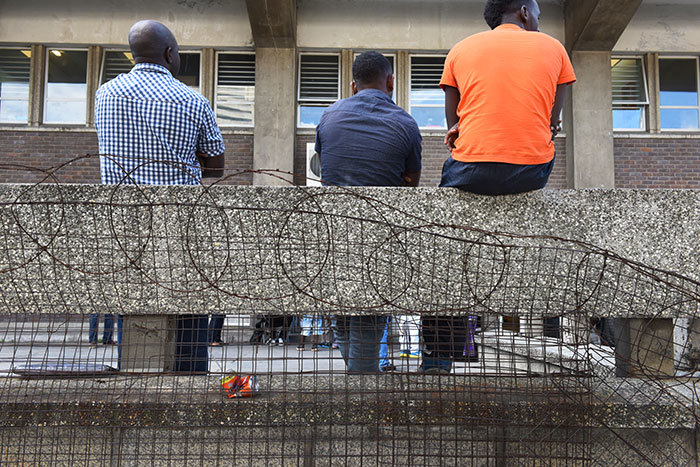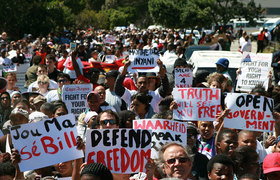What's it like to seek asylum in South Africa?
25 March 2015 | Photo Michael Hammond.
There's a great divide between the rights afforded refugees under the South African Constitution, and how they're treated in their day-to-day dealings with bureaucracy and ordinary citizens. Fatima Khan, director of UCT's Refugee Rights Unit, takes us through some of the challenges refugees – and the people trying to support them – face on an ongoing basis.
While Somali, Bengali and Ethiopian shopkeepers were being attacked and their businesses looted in Soweto in January, Lindiwe Zulu offered scant comfort to the victims: "Foreign business owners in SA's townships cannot expect to co-exist peacefully with local business owners unless they share trade secrets," was the small business development minister's take on the attacks.
"A remark like that is unfortunately completely in line with the current ethos of restricting the rights of refugees – rights that cannot just be taken away, because they've been afforded those rights in terms of the Constitution," says Fatima Khan, director of UCT's Refugee Rights Unit.
That ethos is also at odds with the Refugees Act. South Africa's laws regarding refugees are generous and progressive, says Khan. "Our Constitution is human-rights orientated; it respects not just South Africans but everyone as human beings, and it affords everyone who comes into the country, legally or illegally, the right to dignity.
"The South African definition of 'refugee' is broader than that of most countries in the world, because it is subject to our Constitution," she adds. "Despite these generous laws for refugees, xenophobia is rife, and there is a disparity between the law and policy." The challenge faced by some of the most vulnerable individuals in South African society is an ongoing struggle.
Disjuncture between law and policy
It's on the frontline that the cracks begin to show. "For example, a refugee child with a temporary asylum permit who tries to enroll in a school may find that many schools will reject his or her efforts, saying that the permit is only valid for three months or, even in cases in which the child has refugee status, that the 'permit is only valid for two years, so we're not registering the child'."
As clearly unlawful as that is – according to both the Refugees Act and the Constitution – this type of problem is common, because so few "frontline service providers", from school principals to nurses, know the rights of refugees. Consequently the Refugee Rights Unit spends much time educating these service providers, including government officials and magistrates, on refugee law, which Khan admits is a relatively new field in South Africa.
This is in addition to the initial emergency assistance the unit provides: getting asylum seekers documented, getting them their legal status, and making sure that they are not deported to where they will face serious harm, says Khan.
How difficult is this initial process?
"Very difficult; exceptionally difficult, because we have to deal directly with the Department of Home Affairs." Khan estimates that "90% of Home Affairs' determination of our clients' refugee claims is flawed. There are clear errors; these people should be granted refugee status in the first instance, but they're not. About 90% of them are being rejected."
Clearly it should not be this way. Asylum seekers should get their initial documentation the first time they visit Home Affairs, says Khan. Yet the Department of Home Affairs closed their Cape Town, Port Elizabeth and Johannesburg offices, leaving only three places to apply for asylum in the country – Durban, Pretoria and Musina.
"This is what the government has created now, with their restrictive policies. Because of that you now have large numbers of undocumented people in the country. That is a huge problem."
"We also do a lot of advocacy work ... and we find that if you explain the difference between a refugee and an economic migrant, you find that there is empathy," Khan says. "People realise that [a refugee] is a person genuinely in fear of being harmed who cannot return to his country and whose life is in danger. But it is a challenge getting people to understand this."
 This work is licensed under a Creative Commons Attribution-NoDerivatives 4.0 International License.
This work is licensed under a Creative Commons Attribution-NoDerivatives 4.0 International License.
Please view the republishing articles page for more information.










